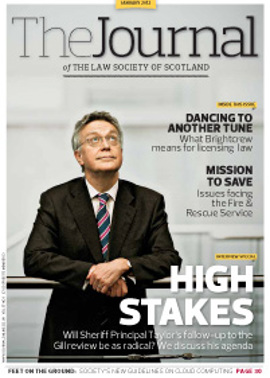Whose law rules?

The Court of Session has grappled with some issues following the collapse of the Icelandic banks: [2011] CSIH 61, 28 September 2011.
Heritable Bank plc was a Scottish registered bank wholly owned by Landsbanki Islands HF, registered in Iceland. Adminstrators were appointed to Heritable on 7 October 2008, the same day as the Financial Supervisory Authority of Iceland took control of Landsbanki.
Landsbanki submitted claims in the Heritable administration for around £137 million, and the administrators submitted claims in the Landsbanki winding up of about £905 million, of which over £660 million was for alleged breach of a revolving loan facility.
The administrators did not dispute the Landsbanki claim, but asserted a right to balance accounts in bankruptcy, the claim then being extinguished by the larger Heritable claim on Landsbanki. Landsbanki rejected all but one small Heritable claim, and appealed against the refusal of their claims by the administrators.
The issue for the courts was which law governed the determination of the claims in the respective insolvencies, and was that fully determinant of the issues in the insolvency administration in the other jurisdiction?
Recognition
The starting point of this discussion is the European Directive on the Re-Organisation and Winding Up of Credit Institutions (2001/24/EC), implemented in UK Law by the Credit Institutions (Re-Organisation and Winding Up) Regulations 2004. The directive extends to the European Economic Area (EEA), of which Iceland is a part, and provides for the mutual recognition of proceedings initiated in home member states of credit institutions.
It was not disputed that Heritable was a UK credit institution and Landsbanki an EEA credit institution. Regulation 5 provides that an EEA insolvency measure has effect in the UK in relation to any branch of an EEA credit institution, any property or other assets of that credit institution, and any debt or liability, as if it were part of general UK insolvency law. Regulation 22 provides that in the winding up of a UK credit institution, the general UK insolvency law applies to (i) the assets forming part of the institution’s estate; (ii) the conditions under which set-off may be invoked; (iii) the treatment of claims; and (iv) the rules governing lodging, verification and admission of claims and distribution of proceeds from realisations.
The directive focuses on a single entity in self-contained proceedings. There is no provision for groups of companies and no attempt to harmonise possibly inconsistent decisions arising in the insolvency proceedings of different entities. Accordingly, as the home member state for Heritable, Scotland has jurisdiction in respect of its insolvency proceedings and Scots law applies in relation to both the procedural and substantive aspects of those proceedings. Thus reg 22 applied to determine Heritable’s assets, liabilities and the conditions of set-off.
Sword and shield
Landsbanki argued that the decision of Landsbanki’s winding-up board to reject Heritable’s claim, also extinguished its claims, and the underlying debts to which they related, for all purposes under Icelandic law. It followed that for Heritable’s administrators to exercise the balancing of accounts as claimed would be inconsistent with the objective of the directive and the meaning of the regulations. The board’s decision in relation to Heritable’s claims was to be given effect as if it were part of the UK law of insolvency.
The Inner House (the opinion being delivered by the Lord President) held that a provision such as contained in reg 5, to exclude the “sword of separate positive proceedings in pursuit of a liability or debt of the credit institution”, was not inconsistent with such a liability or debt being available for use as a “shield”, in the event that the institution should itself bring proceedings in the UK against a debtor here. This approach was consistent with the principle of unity and universality required by the directive, and allowed the affairs of Heritable as a UK credit institution to be wound up with the defences available to it under the general law to protect the interests of its creditors.
The court accordingly held that, although Heritable had lost its right to seek payment for the relative debt by abandoning its claim in the Landsbanki winding-up proceedings, that did not mean that it could not in its own winding-up proceedings rely on that claim in so far (and only in so far) as it is used to defend itself against claims made by Landsbanki. The withdrawal of the claim in Landsbanki’s winding up had effect in Iceland and elsewhere for the purposes of Landsbanki’s winding up. It did not have effect for the purposes of Heritable’s winding up. (We understand this matter is likely to be appealed to the Supreme Court.)
In this issue
- Reading for pleasure
- IP: the call of the south
- IP: home advantage
- Forcing: the issues
- Construction disputes: what of mediation?
- The key to effective trainee development
- Opinion
- Book reviews
- Council profile
- President's column
- Register reborn
- Justice at stake
- A matter of life and death
- The future is Brightcrew?
- Safe keeping
- Always something new
- Control switches
- Hard cases
- Whose law rules?
- Service complaint figures
- Scottish Solicitors' Discipline Tribunal
- Mora no more?
- Head in the cloud - feet on the ground
- Crown offers safer mail
- Law reform roundup
- CPD competition
- Don't be tempted!
- Ask Ash
- Preparing for spring






